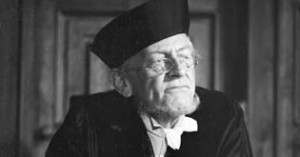Gallery
All Pictures (4)Biography
Otto Gebühr was born in Kettwig (Ruhr) on May 29, 1877, as the son of the merchant Otto Gebühr and his wife Fanny Mathilde Moll. After his father had died, Gebühr and his brother grew up in Cologne, where their mother worked at first as a sewer. Later, she ran a boardinghouse for female students of the music conservatory.
From 1883, he attended the ‘Bürgerschule Friesenstraße’; from 1887 the ‘Realgymnasium’, and from 1890 the ‘Friedrich-Wilhelm-Gymnasium‘. After completing his mercantile apprenticeship in the Cologne-based wool wholesale firm M. Michels & Co. in 1896, he worked as a correspondence clerk in Berlin. At the same time, he attended acting classses for six months.
Before Hans Gregor engaged him at the Stadttheater Görlitz in the winter of 1897, Gebühr joined a traveling theater company with which he toured through Saxony , Thuringia, and Hesse.
From 1898 until 1908, he was a member of the ensemble of the Königliches Hoftheater Dresden, where he also performed as a singer and lute player. Gebühr repeatedly toured the country with a repertoire of folk songs and songs composed by Schubert and Brahms.
In the summer of 1907, he made his Berlin acting debut at the Kleines Theater. In 1909, he spent four months in New York, where he performed at the Irving Palace Theater. In the same year, he got engaged by the Lessingtheater in Berlin. In 1912, Gebühr joined the ensemble of the Theater Königgrätzer Straße, where he stayed until 1914.
In 1914, Gebühr joined the 3rd Field Artillery Regiment as a volunteer and rose through the ranks to become lieutenant. From 1917 until 1919 he worked at the Deutsches Theater in Berlin, where he starred in Hermann Bahr’s "Das Konzert", Ibsen’s "Nora", the operetta "Die Königin der Luft", as well as in Max Reinhardt"s production of Shakespeare"s "The Merchant of Venice".
During these years, Gebühr also started to work in the film business. After some rather unsatisfying jobs as an extra in 1912/1913, Gebühr made his screen debut in 1917 with the Messter production "Der Richter": "… he plays the sparkling character role of a shabby seducer" (Der Film, 11/24/1917).
After Paul Wegener had introduced him to Carl Boese, Gebühr starred as Friedrich II. (1712-86) in Boese"s "Die Tänzerin Barberina". His unmistakabe likeness to Adolph von Menzel"s portrait of Friedrich in his painting "Flötenkonzert in Sanssouci" (1852) predestined him to revive the role in the four-part series "Fridericus Rex" (1920-23) as well as in the following Prussia movies, which in the beginning used to promote national ideas. After 1933, however, they eventually linked Prussia and its kings to National Socialism.
The role of Blücher, as portrayed by Gebühr in Grune"s "Waterloo" (1928), was also reminiscent of Fridericus, as was the character of the King of Saxony in Liebeneiner"s "Bismarck" (1940).
In addition, Gebühr repeatedly portrayed sailors, e.g. in "Schiffe und Menschen" (1920), "Neuland" (1923/24), "In Treue stark" (1926), and in "Scapa Flow" (1929/30).
Rarely did he get the chance to play multidimensional characters such as Gobseck in the film adaption of Balzack’s novella of the same name. In Berthold Viertel"s "Die Perücke" (1924) he starred in a double role as a dressmaker and a prince. With his supporting roles in the sound films "Casanova heiratet" (1939) and "Viel Lärm um Nixi" (1941), Gebühr was able to demonstrate his comedic abilities.
In 1947, he returned to the theater. At the Berliner Komödie he starred alongside Lil Dagover in Čechovs "The Cherry Orchard". During the 1950s, he gave guest performances and played small roles in sentimental films with regional background - usually grumpy fellow or jovial misfits.
In 1910, Gebühr married Cornelia Bertha Julius. His daughter Hilde (born in 1912) as well as Michael - his son from the second marriage (1941-1950) to Doris Krüger - took up the profession of their father.
Otto Gebühr, who spent his last years in Berlin-Zehlendorf, died of a heart attack in Wiesbaden on March 13, 1954, shortly before he could finish his last movie "Rosen-Resli".
